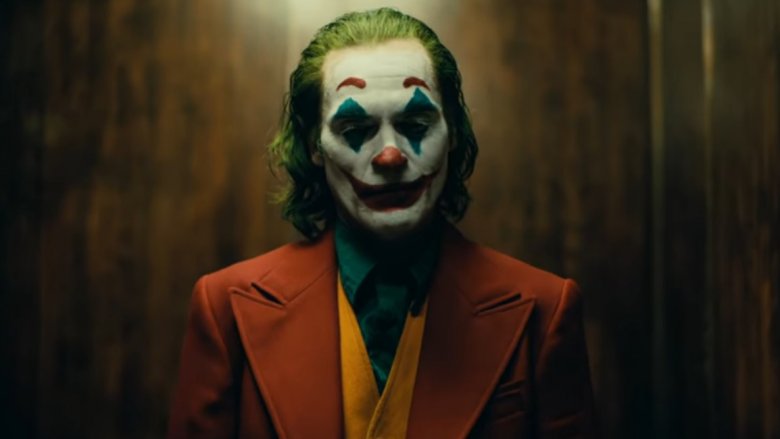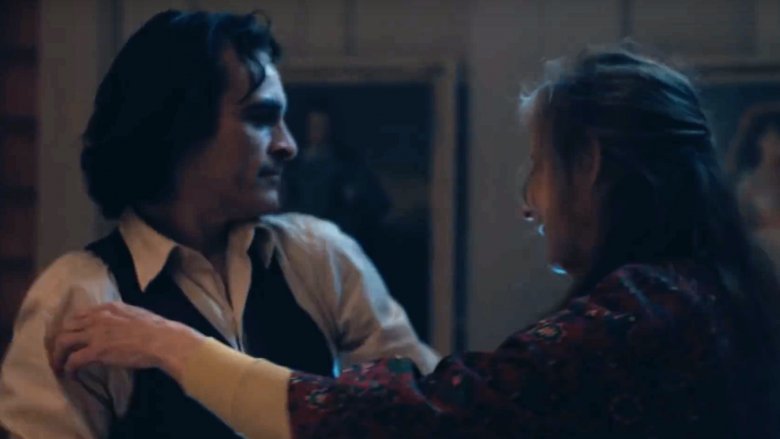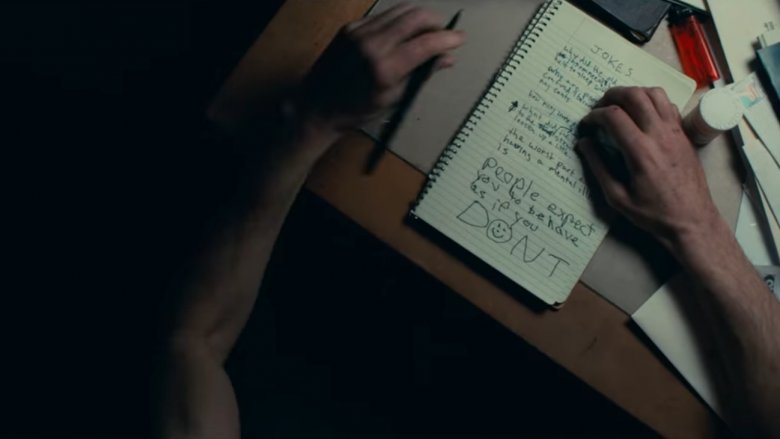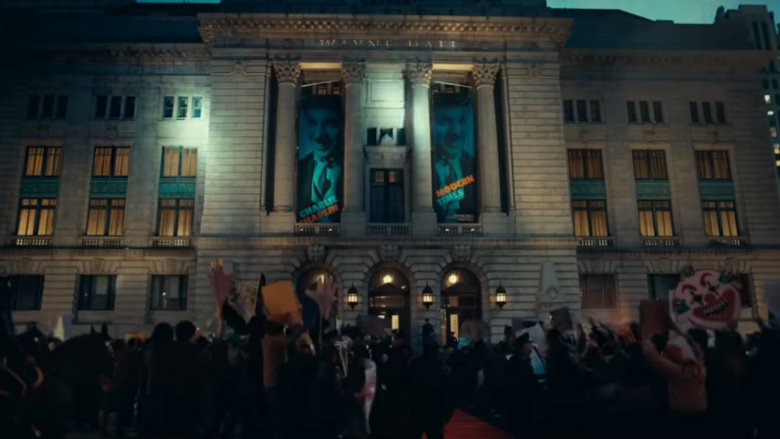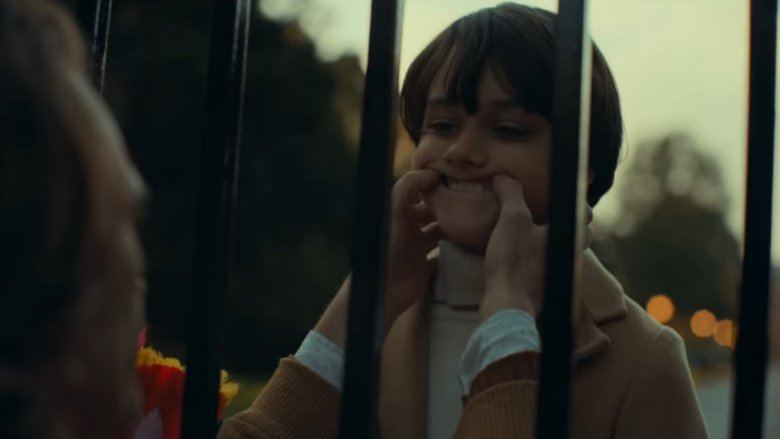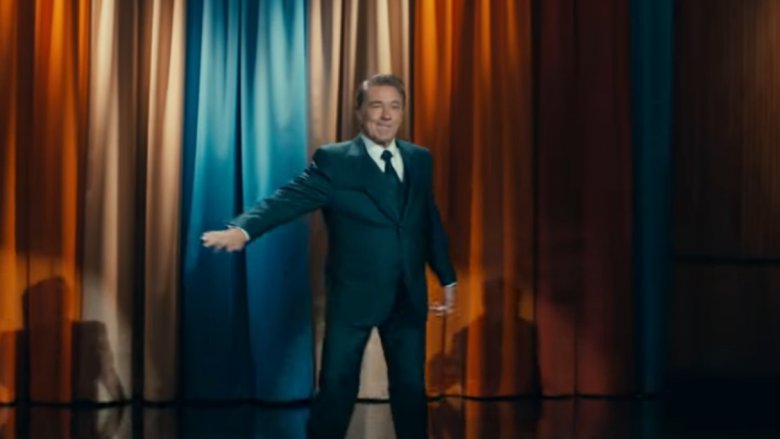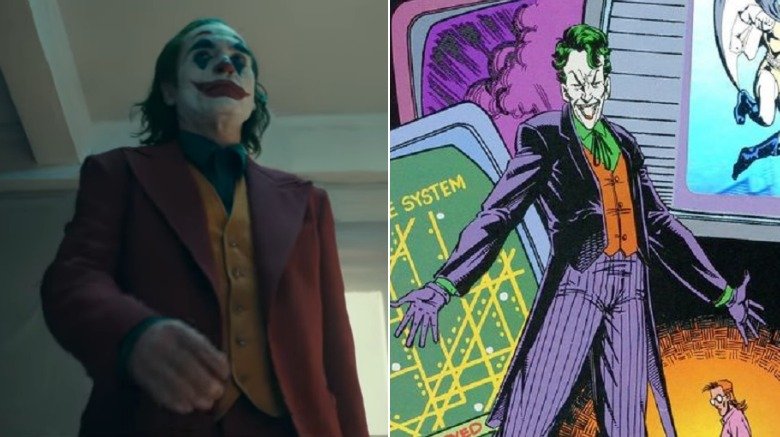Small Details You Missed In The Joker Trailer
The first trailer for Todd Phillips' Joker has arrived, and it looks — in a word — terrifying. Joaquin Phoenix stars as Arthur Fleck, a struggling comedian destined to become Gotham's Clown Prince of Crime — and if there was ever any doubt about the star's capacity to utterly nail the role, this spot goes a long way toward putting any such notions squarely to rest. Phoenix gives us a chilling look into the psyche of a man conflicted, a man whose mother always told him to put on a happy face... which indeed he does, although probably not in the way she intended.
Phillips' film looks to be a true character study, an origin story for a villain whose origins have always been murky, and a showcase for the considerable talents of Phoenix. But more than that, this Joker appears to want to profoundly disturb us in a way that no comic book film quite has, with the possible exception of Heath Ledger's portrayal of the character in 2008's The Dark Knight. Here are some of the small details you may have missed in one of the most interesting trailers of the year so far.
A formative relationship
Fleck is first seen sitting in the office of his therapist, who asks him if it helps to have someone to talk to. He doesn't answer; his first spoken lines in the trailer, heard in voiceover as he makes his lonely way up a set of stone steps, make reference to his mother. "She tells me I have a purpose," he says, "to bring laughter and joy to the world." A part-time clown and struggling comedian, Fleck appears to have taken her advice to heart — but there are clues that their relationship isn't necessarily the healthiest.
Fleck is seen bathing his mother as if she were a child and dancing with her as if she were his wife — the only times she appears in the spot, and the only scenes in which Fleck looks genuinely happy. It can be implied from the therapist's question that Fleck would never share with his mother the darkness inside of him, only showing her the side of himself that conforms with her naive and simplistic worldview — and there are also hints that his mother might actually be the genesis of all of Fleck's troubles, in more ways than one. He appears to be filling a caretaker role here, and the spot subtly implies that Mom's illness is of a specific type.
A recurring theme
The specter of mental illness looms large over the trailer, and the theme surfaces in a brief shot early in the spot. Fleck is seen scribbling in a notebook; although the page features the header "Jokes," the sentiment scrawled out in increasingly large letters at its bottom isn't particularly funny. "The worst part about having a mental illness is, people expect you to behave as if you don't," it reads — and as you probably know, mental illness can be hereditary.
It may be that Fleck's mother's own struggles with the disease will have a part to play here, further suggested by the fact that he is seen visiting Arkham Hospital (where he is visibly disturbed as a patient sharing his elevator thrashes about on a stretcher). Who is he visiting there, if not dear old Mom? The very next shot sees him in the audience at a comedy club (a club called Pogo's, incidentally, which happens to be the stage name of the most notorious clown in history), where we hear the Joker's singularly unhinged cackle coming out of Fleck's mouth for the first time. Could his mother's final descent into the throes of mental illness be one of the factors — perhaps even the decisive factor — that drives him over the edge?
A sad clown
One very brief shot midway through the spot just might touch on many of the film's themes in a very interesting way, particularly if you happen to be a classic film buff. An audience is seen gathering outside a concert hall — Wayne Hall, as a matter of fact — apparently there to catch a screening of the Charlie Chaplin film Modern Times. The more familiar one is with Chaplin's life and work, the more significance this shot takes on.
Although he was a pioneer of comedy in cinema, there was an underlying melancholy to Chaplin's screen persona informed by his difficult upbringing. He had an absentee father, and — notably — a mother who struggled with mental illness and was eventually committed to an asylum. Chaplin would eventually rise to fame behind a pale-faced, clownish persona, and even the titles and production histories of some of his works are provocative in the context of this film. There's The Circus, about a clown who can only make people laugh unintentionally; during its filming, Chaplin's mother died and he went through a divorce. There's Limelight, a later work featuring Chaplin as a washed-up comedian who literally performs up until the moment of his death. There's Laughing Gas, which... well, you can probably put that one together. And of course, there's Modern Times itself, in which Chaplin's beleaguered assembly line worker is hospitalized after suffering a nervous breakdown.
Meet the Waynes
Joker may be the first cinematic appearance of the character to place its focus squarely on the villain rather than Batman, but the trailer goes out of its way to let us know that Fleck's history with the Wayne family will be along and tangled one. While Phillips has insisted that his flick will be a true standalone film and will not be getting any sequels, that doesn't mean he won't in some way explore Fleck and Bruce Wayne's relationship to each other — and indeed, the trailer hints at the fact that Fleck may set young Master Wayne on a dark path early in life.
During one sequence in which Fleck is shown lovingly handling a gun, there's a talking head on his television lamenting that "Gotham's lost its way... what kind of coward would do something that cold-blooded? Someone who hides behind a mask?" This man happens to be none other than Thomas Wayne (Brett Cullen), and a later sequence finds Fleck outside of Wayne Manor's gates, playfully engaging with young Bruce (Dante Pereira-Olson); he then reaches through the gate's bars, pushing the boy's lips up into a twisted smile. Thomas Wayne will apparently serve as an antagonist to Fleck; will the comedian follow in the footsteps of another cinematic Joker, becoming the one to commit the murders which result in the creation of his nemesis?
Interesting casting choice
There are few actors of greater stature than Robert De Niro, and his casting in Joker can certainly be seen as something of a coup for the production — but it can also be seen as something more. Phillips has made no secret of the great Martin Scorsese's influence on his film, and De Niro has appeared in some of the director's greatest works — including Taxi Driver, which features iconic shots of De Niro's Travis Bickle striking shirtless poses very similar to those struck by Fleck in the trailer, and The King of Comedy, which may be somewhat of a blueprint for Joker.
In that film, De Niro portrays Rupert Pupkin, an aspiring comedian with severe mental health issues of his own. A chance meeting with talk show host Jerry Langford (Jerry Lewis) convinces him that he's finally gotten his big break, but when Langford shoots down his request to appear on his show, Pupkin resorts to drastic measures. He kidnaps Langford with the help of an accomplice, and for his ransom, convinces the authorities to proceed with the taping of his show with Pupkin as the opening performer. He proceeds to deliver an absolutely killer set, parlaying the appearance into nationwide fame — a result which, in true Scorsese fashion, may very well have been all in his troubled mind. Considering that De Niro portrays a talk show host in Joker, and that Fleck is seen waiting in the wings of his show, it's safe to say that a similar dynamic may come into play.
Looking sharp
The trailer's closing shots feature Fleck in full Joker mode — his hair dyed a bright green, Pagliacci-inspired makeup in full effect, a bouquet of fake flowers in hand, striding purposefully down what appears to be one of Arkham Hospital's halls wearing a less-than-mirthful expression. He's also seen in the same garb performing a triumphant dance on the very stone steps he's shown traversing at the beginning of the spot, and his look is more "classic Joker" than at any other point in the trailer — but hardcore DC comics fans will have a special appreciation for just how hard the filmmakers nailed his appearance.
Compare the two images above: Fleck at the end of his evolution on the left, and on the right, the Joker as he appeared on the cover of 1991's Robin II, issue #1. Sure, the makeup is different, but it's obvious that Joker's costume designers did their homework, crafting a look more visually evocative of the comics' Clown Prince of Crime than perhaps any we've seen on film thus far. Look, it might be jumping the gun to say that Joker will finally give us a screen version of the character to rival Ledger's all-time great performance — but this trailer, with its attention to detail and focus on Phoenix's nuanced performance, suggest that this previously unthinkable notion might actually be a possibility.
